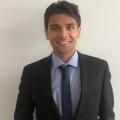Thousands of Muslims in High Wycombe celebrated Eid at several of the town’s mosques on June 5 to mark the end of Ramadan.
The religious holiday is a major event in the Islamic calendar, which sees the community celebrate after refraining from eating or drinking for 30 days between dawn and dusk for Ramadan.
During Ramadan, Muslims can only eat before sunrise and after sunset. It ends with the festival of Eid, which began on June 4 and will continue until today (June 7).
Shafat Ali, secretary of the Wycombe Islamic Mission and Mosque Trust said: “The entire Ramadan period focuses on the theme of forgiveness and atonement, and Eid ul-Fitr is seen as a good opportunity to come together and put old grudges to rest.
“Eid ul-Fitr is one of the most important holy festivals in the Islamic calendar and Muslims in High Wycombe joined millions across the world in celebration.
“The month truly highlights the need for generosity and love, uniting Muslims all over the world and it’s a period of reflection, spiritual awareness and devotion in worship and engagement in charity.”
The festival saw many Muslims pack out their places of worship, as community iftars (the meal eaten after sunset during Ramadan) hosted at the Jubilee Road and Micklefield mosques.
The Micklefield Mosque also hosted a community iftar which took place on May 24.
Mr Ali added: “Throughout the few days of Eid, Muslims engage in regular prayers, sermons and progress between the homes of their close relatives bearing sweets, wishing one another a happy Eid.
“The four-week daytime fast marks the month that Muslims believe their holy book, the Quran, was revealed to the Prophet Mohammed (peace be upon him).
“Ramadan is also a time for Muslims to donate to charity or contribute to the community.
“On Eid ul-Fitr, there is an even stronger focus on charity, and Muslims are expected to donate food or money to the poor whilst generally encouraging a more reflective behaviour.”











Comments: Our rules
We want our comments to be a lively and valuable part of our community - a place where readers can debate and engage with the most important local issues. The ability to comment on our stories is a privilege, not a right, however, and that privilege may be withdrawn if it is abused or misused.
Please report any comments that break our rules.
Read the rules hereLast Updated:
Report this comment Cancel